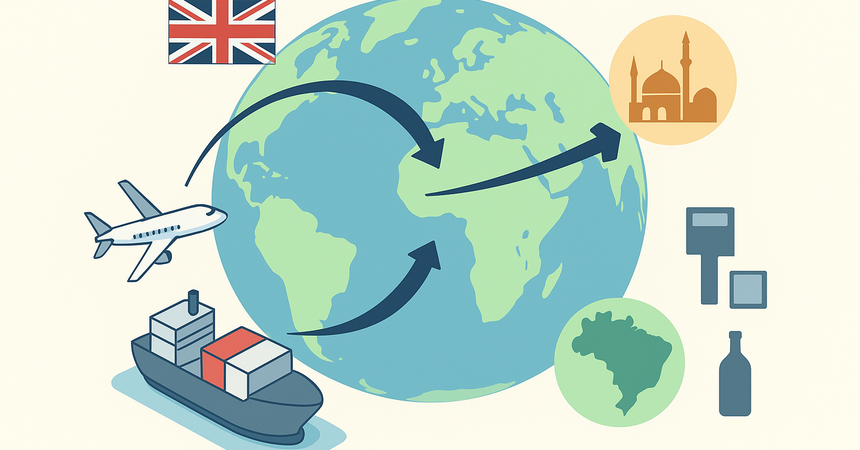After Brexit, British companies have been actively seeking new export destinations outside Europe. Among the most promising regions are the Gulf Cooperation Council (GCC) countries and Brazil.
These markets are characterized by high purchasing power, large-scale infrastructure projects, and growing demand for UK-made products — from industrial and construction equipment to electronics, cosmetics, and medical devices.
1. SASO Certification — The Key to the Saudi Arabian Market
What is SASOSASO (Saudi Standards, Metrology and Quality Organization) is a government body regulating quality and safety standards in Saudi Arabia.
All certification procedures are carried out through the online platform SABER, where importers register their products.
Products requiring SASO certification
- Electrical and electronic devices
- Construction materials
- Furniture and interior products
- Metal structures
- Transport and automotive components
Stages of SASO certification
- Product registration in the SABER system
- Preparation of technical documentation (IEC, CE, ISO tests, specifications)
- Conformity assessment by an accredited body
- Obtaining a Product Certificate (valid for 1 year) and a Shipment Certificate for each consignment
2. ESMA Certification — Access to the UAE Market
What is ESMAESMA (Emirates Authority for Standardization and Metrology) is the UAE regulatory body that establishes safety, energy efficiency, and environmental standards for products.
Main product categories requiring ESMA certification
- Household appliances and electronics
- Cosmetics and perfumes
- Food and beverages
- Automotive components
- Construction materials
Types of ESMA certification
- ECAS (Emirates Conformity Assessment Scheme) — for most industrial and household goods
- EQM (Emirates Quality Mark) — a quality mark confirming that a product meets the highest ESMA standards
- Appointment of a local representative in the UAE
- Preparation of technical documentation (CE, ISO, test reports)
- Application submission via the ECAS system
- Inspection and laboratory testing
- Issuance of an ESMA certificate (valid for 1–3 years)
INMETRO Certification — Brazil
Products subject to INMETRO- Industrial and laboratory equipment
- Consumer electronics
- Cables and lighting equipment
- Medical devices
- Pumps, compressors, and motors
INMETRO certification process
- Appointment of a local representative (must be a Brazilian resident)
- Application to an accredited certification body (OCP)
- Submission of technical documentation (CE, ISO, test reports)
- Testing at an INMETRO-recognized laboratory
- Certification and product registration in the national database
Validity: 3 years (with annual inspection audit)
How to Prepare for Certification- Conduct a preliminary audit of documents: ISO, CE, safety tests
- Identify countries requiring a local representative (SABER, ESMA, INMETRO)
- Translate all documents into Arabic or Portuguese (depending on the region)
- Choose an accredited certification body recognized in the target country
- Allow 6–10 weeks for the process
Conclusion
For British manufacturers, SASO, ESMA, and INMETRO certification is not only a mandatory step for entering the GCC and Brazilian markets but also a powerful reputation tool.It confirms the reliability and technological quality of British products, helps in tenders, accelerates exports, and builds trust with partners and customers.
WorldWideBridge supports British companies through all stages of certification: from requirement analysis and technical documentation to product registration and obtaining SASO, ESMA, and INMETRO certificates.
We provide a full turnkey service — ensuring your entry into international markets is fast, compliant, and hassle-free.
